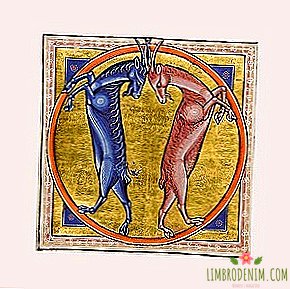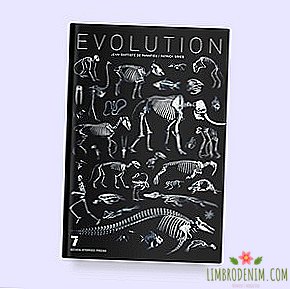Gender researcher Sasha Alekseeva about favorite books
IN BACKGROUND "BOOK SHELF" we ask heroines about their literary preferences and editions, which occupy an important place in the bookcase. Today a gender researcher, the founder of the Higher School of Equality Sasha Alekseeva tells about favorite books.

 Relations with paper books in my life were directly related to elitism: I came to reading through a culture of consumption, more precisely, prestigious consumption. Reading was a way to seem cooler than the "uneducated dullness" around me; now I’m rather sick of memories of that. For example, she re-read at school, until she matured, three times "War and Peace", because no one, except me, mastered it anymore. In the first years of university, I bought fashion books so that they simply stood on the shelf, justifying that some day they would get my hands on them. I am ashamed for that.
Relations with paper books in my life were directly related to elitism: I came to reading through a culture of consumption, more precisely, prestigious consumption. Reading was a way to seem cooler than the "uneducated dullness" around me; now I’m rather sick of memories of that. For example, she re-read at school, until she matured, three times "War and Peace", because no one, except me, mastered it anymore. In the first years of university, I bought fashion books so that they simply stood on the shelf, justifying that some day they would get my hands on them. I am ashamed for that.
Books do not make people more "qualitative", there are no "better-quality" people at all, not to read books is a completely adequate practice that should not be condemned. The book as a format for me is now irrelevant: I basically do not practically read the whole book. In the academic environment, almost all relevant information is now published in the form of articles, they are much more mobile and allow you to stay abreast of the most pressing discussions. I generally keep quiet about paper books - I cannot afford to spend so much money, and I don’t see any point: electronic materials provide much more opportunities for quoting and working with intertext.
I do not read fiction. When there was a time in the first years of university, I liked to play computer games - this is a much more democratic practice, which is completely underestimated and is still considered, as a rule, something shameful. Fiction remained for me in school - then I terribly liked Kafka, Zola, Hesse. It seemed to me that these adults, who were removed by artistic language, describe my problems. It brought satisfaction, I became calmer: this world was so absurd even with them, I stopped feeling one-on-one with my troubles.
Now I don’t have time for anything other than professional literature, a huge part of which I find in social networks. At least half of the books and articles that are now on my iPad, from VKontakte - God save the narrow public pages that are shared with fresh PDF. In this regard, I observe a very funny situation: the Higher School of Economics has given me less relevant literature than Facebook and VK, so every time I laugh sincerely when I see another alarming nonsense about the unique harm of social networks.
I would like to read more in Russian, but, unfortunately, this is rarely possible: almost everything I read does not exist in Russian, or a translation such that I find it harder to read than the original. This affects my language: I began to notice that some phrases are structured in Russian, according to English grammar. It's funny, although sometimes it becomes scary: I feel how my language identity is blurring.
I never consider reading, the number of books read will not give you any information. What was it? Why was this read? Was this reading superficial? I hate articles from the series "I read 189739 books a year and teach you how to do it." This is such a standard capitalist ploy - to unify practice according to one specific criterion, which cannot be unified or reduced, in order to then compete in this field. To hell with that. I am not reading to compete with myself or other people. I read to learn more about the area that interests me, but in the same way I can listen to podcasts or watch notes of lectures and seminars, communicate with colleagues. Reading has long had no monopoly on the transfer of knowledge.
The pace of my reading depends on the author: Deleuze is impossible to read quickly, Ranciera is impossible to read slowly. The complexity of the perception of the text, the quality of the translation, the purpose for which you read - all affect the process. I can read twenty and two hundred and fifty pages per day. Polina Muzyka, my very cool artist friend, had a strong action about this - she read every day, for a full day, a fat book called “Art since 1900”. It was a titanic and almost completely senseless work, which very clearly showed problems with sacralization of reading as a practice.
Sacralization of reading books is a very important problem of the so-called white feminism, with which Wonderzine is often associated. Reading is the practice of privileged people, as it was, and it remains so. It requires a lot of time, patience and skills that often have nowhere to take if you have children and work (the standard situation in post-Soviet Russia, where fathers do not take part in raising children and all the responsibility falls on the mother). For access to books, money and / or Internet literacy is needed, they are not there and neither my mother nor thousands of women all over Russia had any: the question of how to live on fifteen thousand a month is much more relevant for them if you have a child . So no, I do not worry that I read little, I worry that my mother worries about it. In isolation, alone with a child, she still feels obliged to read books that are not available to her now, because she knows that society censures those who do not read them.

Madina Tlostanova
"Decolonial gender epistemology"
The most important book for any feminist in Russia. It is customary for us to copy feminism according to Western templates, which is not only a problem in itself, but also leads to the silence of the current agenda of the post-Soviet space. For example, speaking of racism, we would rather meet an article about the cultural appropriation of the indigenous peoples of America, than about the next disgusting case of racism against Uzbek women or the systematic destruction of the language of small nations.
Tlostanova thoroughly analyzes the most pressing problems, provides an extremely convenient theoretical framework, which can then be effectively used independently. This book seems to me far more important than the classic "Second Floor" and "Beauty Myth" - and I would be glad if it was included in all the reading groups on feminist theory in Russia. Perhaps this would help to call into question the "whiteness" of intersectional feminism, which, despite its postcolonial agenda, came to Russia as a largely colonial practice.
"Gender Theory and Art. Anthology: 1970-2000"
The title of the book speaks for itself - it is not necessary to read it entirely, although each of the articles is beautiful in its own way. But it is very useful to at least familiarize yourself with the table of contents in order to understand the current agenda of feminist art, which I love dearly. They included both the classic "Cyborg Manifesto" and "Why there were no great artists?", And much less well-known in our "Time of Women" by Kristeva and "Sexual Difference as a Nomadic Political Project" Bridotti.
Pierre Bourdieu
"Male domination"
She offered this book to be reviewed at a university in order to annoy a sexist teacher. He was expecting a typical text of Bourdieu about art, in the end he received three pages of my sufferings about patriarchy - it was fun. I can’t say that I’m scared to recommend the whole book to the reader: it’s not all that useful or fascinating. I really liked the analysis of food, where the gender division of what we eat is witty explained: everyone understands why women eat salads, and men - meat (preferably raw and with blood), but that's why men hardly eat fish, I I read this text, sincerely perplexed.
Valerie Bryson
"The political theory of feminism. Introduction"
"The political theory of feminism", "Decolonial gender epistemology" and not included in this list "12 lectures on gender sociology" - in my opinion, three board books of modern feminists. In my life, Bryson came at a time when I knew very little about feminism, and this book preventively answered a huge number of stupid questions on my part. If you have a boyfriend or girlfriend who gets you by them - now you know what to do.
Lee edelman
"No Future: Queer Theory and the Death Drive"
I have not read the book itself, as it usually happens to me, but I read a wonderful review of it by "Fuck the Future" by Carla Freccero. It describes in detail how mainstream policy places all hopes and fears on the Child with a capital letter. Edelman's innovation lies in the fact that she suggests that queer politics be hammered into a liberal reproductive policy and leave in the past a fictional child, who is now already taken by two mothers or two fathers. As a childfree, I find this position very interesting: I am tired of taking care of children that I don’t and never will. In general, "Fuck the Future".
Suhail malik
"Exit not escape"
This book has not yet been released, but I already refer to it within the framework of the diploma: Malik’s videos of lectures of the same name have been available on the Internet for a long time, where he analyzes the most relevant discourse, which describes contemporary art, in more detail. Meta-analysis of this quality is very difficult to find, I listened to each of his lectures more than five times and do not get tired to be surprised at their accuracy.
Hannah Arendt
"About the revolution"
I love Arendt with all my heart, she greatly influenced me in the first years of university. The cult figure, was and remains for me a role-playing female model in this sad world of men. Her book about the revolution is less known than about the banality of evil, but in vain - I think this is a very important work. After this book I had more questions than before, but this is probably even good - an indicator of the beginning of at least some thought process.
Herbert Marcuse
"Repressive Tolerance"
I already hear in my head a million comments that there are much more modern and much less controversial articles on this topic, but this text influenced me most of all because of its honesty and provocativeness. At one time, he answered a million very important questions for me and is still my guideline, helping to conceptualize what I do in the social field as an activist. If you, too, have ever wondered, "Is it worth tolerating non-tolerance?" and said that it was "just a joke / idea / ...", then Marcuse might help you as much as I do.
Chantal mouffe
"Agonistics: Thinking the World Politically"
Chantal Mouffe is a very cool political philosopher, a professor of political science, in whose lectures I fell in love at first sight. For me, Mouffe is a modern analogue of Arendt in terms of the impact this book had on me. She legitimized for me many things that were on the left agenda until recently were banned: populism, appeal to institutions affiliated with the state. I would advise everyone to read it who would like to understand the current agenda of modern left theory.
Jacques rancieres
"Clueless Teacher"
Absolutely necessary for each student revolutionary work on the overvalued status of teachers. In Russian, unfortunately, there is only an excerpt, but it is enough to question the authority of your university patriarch. Be prepared to justify after this the mediocre killing of time at lectures that are obligatory to attend, it will be almost impossible, and your study part or lecturer will hardly reach such a level of awareness as to release you without consequences.




